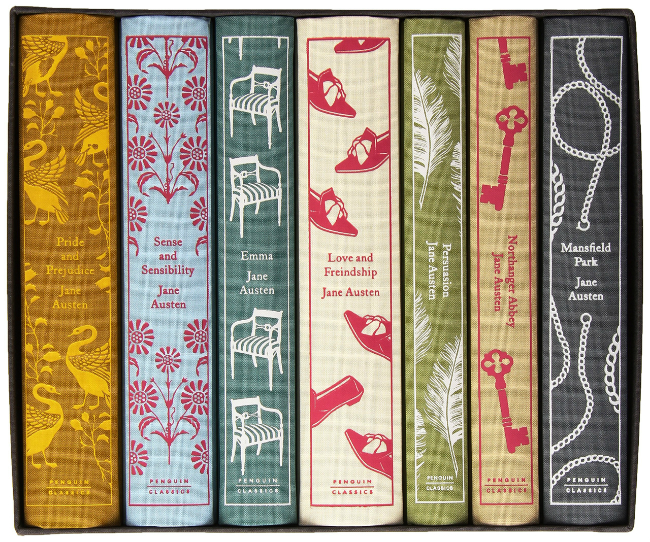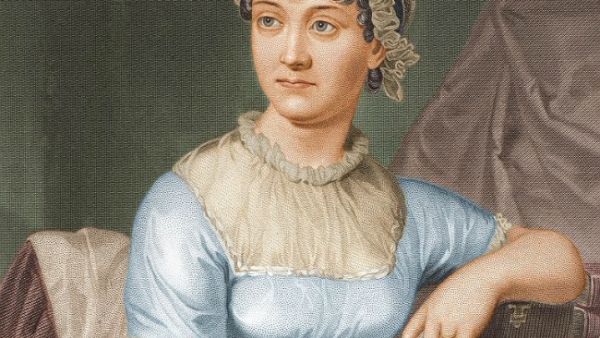Jane Austen has endured. Through a combination of history, British imperialism, the GCSE curriculum, and a barrage of Hollywood and BBC productions, it’s hard to meet a person who isn’t at least aware of Austen or Pride and Prejudice.
But here’s the thing: Austen also endures because, despite the myriad of productions, derivations, I Heart Mr. Darcy tote bags, satires, and Austen’s own concern with the little lives of 18th century Britons, she’s managed to actually be a good writer. A first-rate ironist with a sharp eye for characterisation and an erudite ear, Austen turns the microcosm of everyday 18th century Britain into something more universal. The details are English, but who hasn’t met a Mrs. Bennet?
Austen has been dead for 200 years. Her works, however, are not. We thought we’d take this opportunity—Austen finally gracing the £10 note in the UK and the anniversary of her passing—to pull some choice quotes out of her books. We’ve limited the number down to six—the number of novels she wrote.

Above: A collection of Austen's books from Penguin Classics. (Penguin Books)
01. On Accomplished Women (from Pride and Prejudice)
Austen didn’t stand for the idealism women were expected to meet in her age (and, truthfully, sometimes this one). This exchange from Pride and Prejudice lays out her thoughts:
“Your list of the common extent of accomplishments,” said Darcy, “has too much truth. The word is applied to many a woman who deserves it no otherwise than by netting a purse or covering a screen. But I am very far from agreeing with you in your estimation of ladies in general. I cannot boast of knowing more than half-a-dozen, in the whole range of my acquaintance, that are really accomplished.”
“Nor I, I am sure,” said Miss Bingley.
“Then,” observed Elizabeth, “you must comprehend a great deal in your idea of an accomplished woman.”
“Yes, I do comprehend a great deal in it.”
“Oh! certainly,” cried his faithful assistant, “no one can be really esteemed accomplished who does not greatly surpass what is usually met with. A woman must have a thorough knowledge of music, singing, drawing, dancing, and the modern languages, to deserve the word; and besides all this, she must possess a certain something in her air and manner of walking, the tone of her voice, her address and expressions, or the word will be but half-deserved.”
“All this she must possess,” added Darcy, “and to all this she must yet add something more substantial, in the improvement of her mind by extensive reading.”
“I am no longer surprised at your knowing only six accomplished women. I rather wonder now at your knowing any.”
“Are you so severe upon your own sex as to doubt the possibility of all this?”
“I never saw such a woman. I never saw such capacity, and taste, and application, and elegance, as you describe united.”
Mrs. Hurst and Miss Bingley both cried out against the injustice of her implied doubt, and were both protesting that they knew many women who answered this description, when Mr. Hurst called them to order, with bitter complaints of their inattention to what was going forward. As all conversation was thereby at an end, Elizabeth soon afterwards left the room.
02. On Exaggeration
This line from Sense and Sensibility simultaneously describes a character’s beauty and the kind of hubbub around such description: “When she was called a beautiful girl, truth was less violently outraged than usually happens.”
03. On Settling
Again, from Pride and Prejudice:
Had Elizabeth's opinion been all drawn from her own family, she could not have formed a very pleasing picture of conjugal felicity or domestic comfort. Her father, captivated by youth and beauty, and that appearance of good humour which youth and beauty generally give, had married a woman whose weak understanding and illiberal mind had very early in their marriage put an end to all real affection for her. Respect, esteem, and confidence, had vanished forever; and all his views of domestic happiness were overthrown. But Mr. Bennet was not of a disposition to seek comfort for the disappointment which his own imprudence had brought on in any of those pleasures which too often console the unfortunate for their folly or their vice. He was fond of the country and of books; and from these tastes had arisen his principle enjoyments. To his wife he was very little otherwise indebted than as her ignorance and folly had contributed to his amusement. This is not the sort of happiness which a man would in general wish to owe to his wife; but where other powers of entertainment are wanting, the true philosopher will derive benefit from such as are given.
04. A Modern Gem from Persuasion
Persuasion, Austen's final novel and perhaps her best, throws-out something surprisingly modern:
She had no resources for solitude.
05. On the Nature of Truth
From Emma:
Seldom, very seldom, does complete truth belong to any human disclosure; seldom can it happen that something is not a little disguised, or a little mistaken; but where, as in this case, though the conduct is mistaken, the feelings are not, it may not be very material.
06. And This Observation from Northanger Abbey
Austen had a sharp wit, and she flexed it in Northanger Abbey:
I cannot speak well enough to be unintelligible.
Do yourself a favour and pick-up an Austen novel today.








